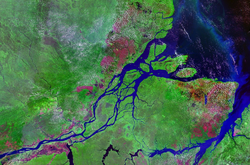Ecoregion

An ecoregion (ecological region), sometimes called a bioregion, is the next smallest ecologically and geographically defined area beneath "realm" or "ecozone". Ecoregions cover relatively large area of land or water, and contain characteristic, geographically distinct natural communities and species. When defined by the World Wide Fund for Nature (WWF), the boundaries of an ecoregion approximate the original extent of the natural communities prior to any major recent disruptions or changes. The WWF has identified 825 terrestrial ecoregions, and approximately 450 freshwater ecoregions across the Earth.
World Wide Fund for Nature's full definition of an ecoregion, which is widely accepted and used, is the following:
- A large area of land or water that contains a geographically distinct assemblage of natural communities that
- (a) share a large majority of their species and ecological dynamics;
- (b) share similar environmental conditions, and;
- (c) interact ecologically in ways that are critical for their long-term persistence.
The Global 200 is the list of ecoregions identified by the World Wide Fund for Nature (WWF) as priorities for conservation.
Terrestrial
A terrestrial ecoregion is a certain area of land which is different from the area near it. It has a distinct climate, geology, type of soil, water availability, and distinct living species (the animals and plants that live in the ecoregion).
For example, one ecoregion can be a desert. It would have sand, very little water, very hot temperatures during the day and very cold at night. The plants could be just bushes, small trees, cactii. The animals could be scorpions, little mammals, spiders.
Or for example, an ecoregion could be a tropical forest It would have warm temperatures all day, a lot of rainfall all year, a huge river crossing, and a very organic soil. The plants could be huge trees or ferns. The animals could be insects, birds, fish and apes.
Marine
Marine ecoregions are regions of the world's oceans, that are defined by the WWF, to help activities for saving marine ecosystems.
The scheme used to find out these ecoregions is more or less the same as that for terrestrial ecoregions. Major habitat types are identified: polar, temperate shelfs and seas, temperate upwelling, tropical upwelling, tropical coral, pelagic, abyssal, and hadal (ocean trench) — which correspond to the terrestrial biomes. Major biogeographic realms, analogous to the seven terrestrial ecozones, represent large regions of the ocean basins: North Temperate Atlantic, Eastern Tropical Atlantic, Western Tropical Atlantic, South Temperate Atlantic, North Temperate Indo-Pacific, Central Indo-Pacific, Eastern Indo-Pacific, Western Indo-Pacific, South Temperate Indo-Pacific, Southern Ocean, Antarctic, Arctic, and Mediterranean.
The classification of Marine ecoregions is not developed to the same level of detail and comprehensiveness as that of the terrestrial ecoregions; only the priority conservation areas of the Global 200 are listed.
See Global 200 Marine ecoregions for a full list of marine ecoregions (World Wide Fund for Nature).
Freshwater
Freshwater ecoregions are the freshwater habitats of a particular geographic area, including rivers, streams, lakes, and wetlands. Freshwater ecoregions are distinct from terrestrial ecoregions, which have biotic communities of the land, and marine ecoregions, which are biotic communities of the oceans.
The WWF speaks of seven major habitat types of freshwater ecoregions: Large rivers, large river headwaters, large river deltas, small rivers, large lakes, small lakes, and xeric basins.
Several freshwater ecoregions are listed in the Global 200, the WWF's priority ecoregions for conservation of biodiversity.
Ecoregion Media
The Ötztal Alps, a mountain range in the central Alps of Europe, are part of the Central Eastern Alps, and can both be termed as ecoregions.
A conifer forest in the Swiss Alps (National Park).
Proportion of forest area by forest area density class and global ecological zone, 2015, from Food and Agriculture Organization publication The State of the World's Forests 2020. Forests, biodiversity and people – In brief
View of Earth, taken in 1972 by the Apollo 17 crew. Approximately 71% of Earth's surface (an area of some 361 million square kilometers) consists of ocean
The Amazon River in Brazil.
Sources
- Brunckhorst, D. 2000. Bioregional planning: resource management beyond the new millennium. Harwood Academic Publishers: Sydney, Australia.
Related pages
Other websites
- World Wide Fund for Nature: ecoregions
- Sierra club: ecoregions Archived 1996-11-21 at the Wayback Machine
- Activist network cultivating Ecoregions/Bioregions
- A National Ecological Framework for Canada Archived 2005-07-24 at the Wayback Machine
- Ecoregions of North America Archived 2015-09-24 at the Wayback Machine
- Interactive map and images of North American ecoregions at bioimages.vanderbilt.edu
- Map of the ecozones






